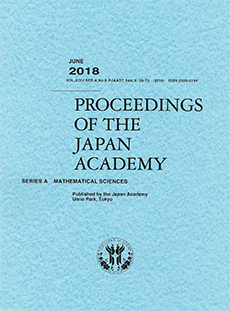Proc. Japan Acad. Ser. A Math. Sci. 94 (2), 17-20, (February 2018) DOI: 10.3792/pjaa.94.17

KEYWORDS: Conjugate algebraic numbers, quadratic extensions of $\mathbf{Q}$, 11R04, 11R11
Let $f$ and $g$ be two linear forms with non-zero rational coefficients in $k$ and $\ell$ variables, respectively. We describe all separable polynomials $P$ with the property that for any choice of (not necessarily distinct) roots $\lambda_{1},\ldots,\lambda_{k+\ell}$ of $P$ the quotient between $f(\lambda_{1},\ldots,\lambda_{k})$ and $g(\lambda_{k+1},\ldots,\lambda_{k+\ell}) \ne 0$ belongs to $\mathbf{Q}$. It turns out that each such polynomial has all of its roots in a quadratic extension of $\mathbf{Q}$. This is a continuation of a recent work of Luca who considered the case when $k=\ell=2$, $f(x_{1},x_{2})$ and $g(x_{1},x_{2})$ are both $x_{1}-x_{2}$, solved it, and raised the above problem as an open question.

